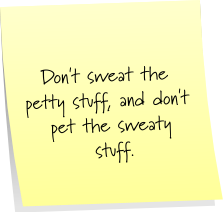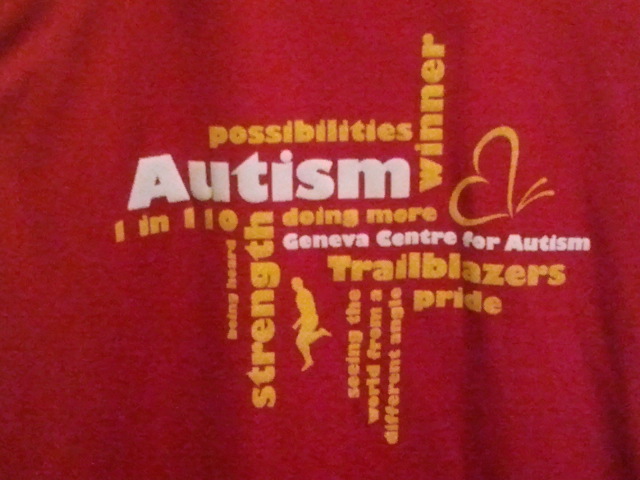I am participating in the 2012 Wordcount Blogathon, which means one post every day for the month of May.
I have a tendency to take on too much. In this regard I am very much like most moms. Whether it’s genetic wiring or just a normal part of motherhood, trying to do everything for everybody is just what we do.
From time to time, we get challenged on this by well-meaning people who say things like, “You have so much on your plate. You really need to learn how to say no.”
Yeah, like that’s going to happen. We can’t possibly say no, because, you know, we’re doing it for the children. All of the late nights, and the hours spent doing laundry, and the long commutes to full-time jobs – we do it all for the children.
While this is perfectly legitimate most of the time, there are times when we use the “for the children” line simply because we cannot process the idea that it’s OK to actually do something for ourselves once in a while.
For instance, when people ask me why I run, I tell them that it’s for my son, to raise funds for autism. It is true that this is what got me back into running after a long break, and it is also true that it helps a great deal with my motivation. But let’s be honest – there are other ways to raise funds for autism that don’t involve entire Sunday mornings spent running instead of with my family. When it comes down to it, I run because it makes me happy , but I’m darned if I’ll actually say that out loud.
My husband has this computer game that he plays most evenings. It’s one of those war games where tanks blow up other tanks – a guy game that I, as a woman, don’t really get. He says he plays this game to unwind and release some stress, and I completely understand that. He works hard and he does have a lot of stress to deal with. It’s perfectly reasonable that he would need an outlet. But when I play my computer games at the end of a long, stressful day, it is under the cloak of intense guilt. I feel that the time I’m spending actually enjoying myself should instead be spent doing something for somebody else.
I know I’m not alone in this. I ran an informal poll on my social media feeds asking fellow moms for their views. Here’s some of what they had to say:
Kerry says that she feels guilty when she does things for herself or buys herself anything. “Can’t get a hair cut, the child needs one first. Can’t buy a new pair of shoes. Too much guilt!”
Tammy had a one-word answer to the question of whether she feels the guilt: “YYYYEEESSSSSSSS”
Hollie poignantly said she doesn’t feel the guilt, “because it’s very rare that I do anything for myself.” This is in a similar vein to Ruth, who says that she doesn’t feel guilty as such, but she’s simply lost the hang of doing things for herself.
Sara, a single mom of special needs kids who really needs a break, reports that she recently considered canceling a vacation so she could buy a car seat for her child, who doesn’t even need it yet. And Nicole said that the few times she doesn’t feel guilty, she starts to feel guilty about not feeling guilty!
I wonder why that is, just why we moms are able to turn guilt into even more of an art form than the Catholics. I mean, we are fully prepared to acknowledge when other people, like our husbands, deserve a break. Why can’t we do the same for ourselves?
If we got just a little bit better at slowing down once in a while, and unashamedly doing stuff we enjoy simply because we enjoy it, maybe we would feel less overwhelmed.
I have great admiration for the moms who strike more of a balance, the moms who take a stand for themselves and say, “You know what? I deserve this and I’m going to enjoy it without feeling guilty about it!”
Fellow mom Marci says she used to feel the guilt, but not anymore. “I found that doing *me* made me calmer and more available to my cherubs!!! Best thing I could’ve done for the family.”
Marci is one of several moms who have managed to make peace with the idea that they are as important as the people they take care of. As Jacquie says, ” If I don’t take care of ME, who’s going to take care of THEM?”
Randi agrees. “I realize that if I don’t take care of me, I’m going to be grumpy and not a good mom.”
Today is Mothers Day in most parts of the world. It is a day when, if we’re lucky, our families take the time to let us know they appreciate us. Why don’t we do that for ourselves as well, and for each other? Let’s give ourselves a much-deserved pat on the back and acknowledge all that we do.
And let’s make a decision to take care of ourselves and spoil ourselves once in a while, without feeling guilty, not just today but always.
Because we deserve it.
Happy Mothers Day.
(Photo credit: http://www.flickr.com/photos/sergemelki/3519265411/. This picture has a creative commons attribution license.)

















